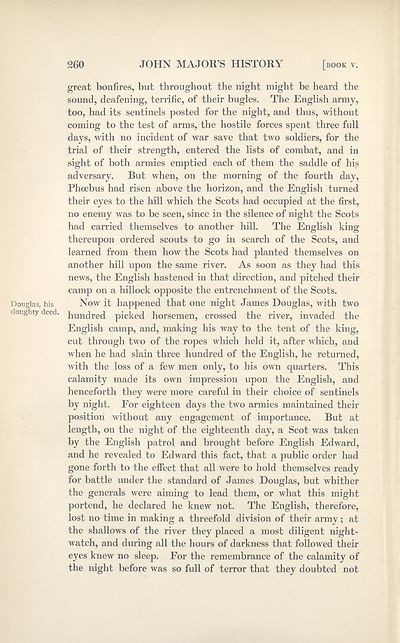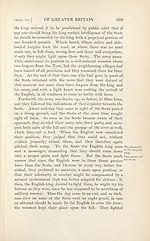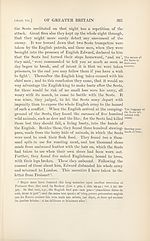Series 1 > History of Greater Britain, as well England as Scotland
(405) Page 260
Download files
Complete book:
Individual page:
Thumbnail gallery: Grid view | List view

260
JOHN MAJOR’S HISTORY
[book V.
great bonfires, but throughout the night might be heard the
sound, deafening, terrific, of their bugles. The English army,
too, had its sentinels posted for the night, and thus, without
coming to the test of arms, the hostile forces spent three full
days, with no incident of war save that two soldiers, for the
trial of their strength, entered the lists of combat, and in
sight of both armies emptied each of them the saddle of his
adversary. But when, on the morning of the fourth day,
Phoebus had risen above the horizon, and the English turned
their eyes to the hill which the Scots had occupied at the first,
no enemy was to be seen, since in the silence of night the Scots
had carried themselves to another hill. The English king
thereupon ordered scouts to go in search of the Scots, and
learned from them how the Scots had planted themselves on
another hill upon the same river. As soon as they had this
news, the English hastened in that direction, and pitched their
camp on a hillock opposite the entrenchment of the Scots.
Douglas, his Now it happened that one night James Douglas, with two
doughty deed. }jU]1(jre(j picked horsemen, crossed the river, invaded the
English camp, and, making his way to the tent of the king,
cut through two of the ropes which held it, after which, and
when he had slain three hundred of the English, he returned,
with the loss of a few men only, to his own quarters. This
calamity made its own impression upon the English, and
henceforth they were more careful in their choice of sentinels
by night. For eighteen days the two armies maintained their
position without any engagement of importance. But at
length, on the night of the eighteenth day, a Scot was taken
by the English patrol and brought before English Edward,
and he revealed to Edward this fact, that a public order had
gone forth to the effect that all were to hold themselves ready
for battle under the standard of James Douglas, but whither
the generals were aiming to lead them, or what this might
portend, he declared he knew not. The English, therefore,
lost no time in making a threefold division of their army; at
the shallows of the river they placed a most diligent night-
watch, and during all the hours of darkness that followed their
eyes knew no sleep. For the remembrance of the calamity of
the night before was so full of terror that they doubted not
JOHN MAJOR’S HISTORY
[book V.
great bonfires, but throughout the night might be heard the
sound, deafening, terrific, of their bugles. The English army,
too, had its sentinels posted for the night, and thus, without
coming to the test of arms, the hostile forces spent three full
days, with no incident of war save that two soldiers, for the
trial of their strength, entered the lists of combat, and in
sight of both armies emptied each of them the saddle of his
adversary. But when, on the morning of the fourth day,
Phoebus had risen above the horizon, and the English turned
their eyes to the hill which the Scots had occupied at the first,
no enemy was to be seen, since in the silence of night the Scots
had carried themselves to another hill. The English king
thereupon ordered scouts to go in search of the Scots, and
learned from them how the Scots had planted themselves on
another hill upon the same river. As soon as they had this
news, the English hastened in that direction, and pitched their
camp on a hillock opposite the entrenchment of the Scots.
Douglas, his Now it happened that one night James Douglas, with two
doughty deed. }jU]1(jre(j picked horsemen, crossed the river, invaded the
English camp, and, making his way to the tent of the king,
cut through two of the ropes which held it, after which, and
when he had slain three hundred of the English, he returned,
with the loss of a few men only, to his own quarters. This
calamity made its own impression upon the English, and
henceforth they were more careful in their choice of sentinels
by night. For eighteen days the two armies maintained their
position without any engagement of importance. But at
length, on the night of the eighteenth day, a Scot was taken
by the English patrol and brought before English Edward,
and he revealed to Edward this fact, that a public order had
gone forth to the effect that all were to hold themselves ready
for battle under the standard of James Douglas, but whither
the generals were aiming to lead them, or what this might
portend, he declared he knew not. The English, therefore,
lost no time in making a threefold division of their army; at
the shallows of the river they placed a most diligent night-
watch, and during all the hours of darkness that followed their
eyes knew no sleep. For the remembrance of the calamity of
the night before was so full of terror that they doubted not
Set display mode to:
![]() Universal Viewer |
Universal Viewer | ![]() Mirador |
Large image | Transcription
Mirador |
Large image | Transcription
Images and transcriptions on this page, including medium image downloads, may be used under the Creative Commons Attribution 4.0 International Licence unless otherwise stated. ![]()
| Scottish History Society volumes > Series 1 > History of Greater Britain, as well England as Scotland > (405) Page 260 |
|---|
| Permanent URL | https://digital.nls.uk/127736625 |
|---|
| Attribution and copyright: |
|
|---|
| Description | Over 180 volumes, published by the Scottish History Society, containing original sources on Scotland's history and people. With a wide range of subjects, the books collectively cover all periods from the 12th to 20th centuries, and reflect changing trends in Scottish history. Sources are accompanied by scholarly interpretation, references and bibliographies. Volumes are usually published annually, and more digitised volumes will be added as they become available. |
|---|


